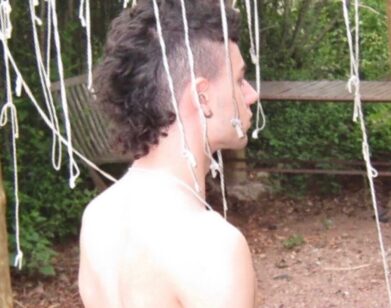Exclusive Mixtape Premiere and Interview: ‘Part 3,’ Liphemra

ABOVE: LIPHEMRA. PHOTO COURTESY OF PRETTY PUKE
“I just wanna end it,” we hear someone confess over a piano loop and simple drum beat during the opening track of Part 3, the new mixtape from L.A.-based drummer/vocalist Liphemra. There is a voyeuristic element captured here, drawing us into a space where vulnerability and the fresh wounds of heartbreak are ripe. Although only 16 minutes long, the seven-track tape feels like something complete. Liphemra has created a mysterious soundscape where the profound discomfort and nauseating side effects of heartache reside, a place where electronic beats, jazz, and hip hop are all fused together to create a multi-textured pulse. Shifting between feelings of profound hurt to just not caring, Liphemra conjures a sense of being thrown into the ocean: she takes you from the surface down to the very bottom. In tracks like “Champion,” her jazz-inspired vocals turn into a lament of apology, while tracks like “Bloodwork” reveal something sinister, almost ghostly.
Liphemra records under a mysterious guise, preferring not to reveal her identity. She can count Flying Lotus as a direct mentor and has been playing the drums since middle school. Having shared the stage with an impressive roster of acts, she recently opened for Connan Mockasin and is playing the Desert Daze Festival this month with groups including Blonde Redhead and DIIV. Interview is thrilled to premiere Part 3, below. We recently spoke to Liphemra about secret recordings, heartbreak, and Radiohead.
J.L. SIRISUK: How are things in L.A.? Is the sun shining?
LIPHEMRA: It’s actually kind of windy and nice. A little bit cloudy.
SIRISUK: So you like it better when it’s cloudy and windy?
LIPHEMRA: I do, I do. I like a little bit of cold weather.
SIRISUK: Ah, so you’re not a typical L.A. girl, preferring the sunshine.
LIPHEMRA: Yeah. I like both, but I really like an excuse to kind of hole up and be moody and shit.
SIRISUK: I remember when I saw you months ago at The Echo in L.A. and you told everyone that you were sick, but that didn’t seem to hinder your performance at all. You really killed it on the drums. When did you start playing?
LIPHEMRA: When I was about 12 years old, I’d say. My parents are both musicians, and my mother is a classical piano player, so she had me playing classical piano at five years old. At a certain point I switched—I was like, “Okay, Dad, I want to play drums,” because my dad’s a drummer, so I moved over to his side of things.
SIRISUK: When you first started playing, how did it feel? Obviously you really enjoyed it if you continued playing, but do you remember how it felt the first time you made that switch to playing drums?
LIPHEMRA: It felt amazing. There’s nothing like it. It was like the best thing I could have done as a young girl. I think it’s really hard and confusing growing up, especially in middle school, and I went to an all-girls Catholic middle school. It was really strict, and I was kind of the odd one out. I would just get in a lot of trouble and get really bad grades, and I just didn’t belong there, and playing drums was a really good outlet for me. It kept me doing something productive because I feel like I would’ve gotten into a lot more trouble than I did. [laughs]
SIRISUK: Did you end up leaving the Catholic school?
LIPHEMRA: Yeah, I did. I ended up going to a really great arts high school in downtown L.A., called L.A. County High School for the Arts.
SIRISUK: Did you start playing gigs in high school? When did you think, “I’d like to pursue this a bit more seriously?”
LIPHEMRA: I think it was always a goal for me, but for a long time it was a personal thing that I would practice in my house, and be alone for hours and do my thing. I think I was really shy about it for a while and kind of nervous, and when I got into high school, I had a lot of great mentors and teachers who at the time we were doing a lot of jazz. That’s what I started really getting into and they believed in me and encouraged me to play out more. That’s when I think I got really serious—when I was in high school. Specifically the later part of high school.
SIRISUK: I know you’ve played with some pretty impressive bands, including Cold War Kids. How did all of that happen?
LIPHEMRA: Right out of high school, I started getting asked to play a lot more, and it just kind of happened like wildfire. I didn’t realize how I played. I thought I was the worst fucking drummer ever. I think it just takes a few people to believe in you and then all of a sudden, everybody wants to get together and jam. It’s just kind of word of mouth. I was really lucky to have a lot of great mentors, like Benmont Tench. He was a really great mentor to me and is the longtime keyboardist for Tom Petty. He kind of brought me into a whole other world.
SIRISUK: It sounds like you grew up in a very musical household. Is there one album in particular you remember hearing growing up that was one of your favorites, or an artist that inspired you?
LIPHEMRA: Honestly, Radiohead. Every fucking day. [laughs]
SIRISUK: I’m not surprised. Listening to the mixtape, in terms of influence, I hear a bit of Radiohead and even a little bit of Portishead.
LIPHEMRA: The first time I heard Portishead, I was like, “What the fuck is this? This is bad.” I know, this sounds crazy, and then people started telling me, “You sound like this band Portishead.” I was like, “All right, fuck it, I’m going to listen to this band,” and I thought, “Holy shit, they’re amazing.” Now I’m super into them. But that was after the fact, I just happened to pick up on some of their vibes. But Radiohead, and a lot of hip-hop growing up, and I got to intern at Stones Throw [Records], which was a huge influence hip hop-wise to me. I would go to Low End Theory every Wednesday, so it was a lot of hip-hop and a lot of Flying Lotus and a lot of Radiohead.
SIRISUK: Going back to Portishead, what is it that you didn’t like about them?
LIPHEMRA: I think at the time when I first heard it, it was just too real to me. It made me feel something uncomfortable, and I would say the first time I heard it I was probably in early high school, and I was not mentally ready to even think about writing like that. But it’s just heavy stuff, and you’ve got to be ready to go there emotionally if you’re going to listen to stuff like that, and I don’t think a lot of people are. I wasn’t at the time—I was listening to jazz. Just jazz and Radiohead and hip-hop.
SIRISUK: It’s funny you mention that quality of feeling a little bit uncomfortable and not ready to face those emotions. In the beginning of the mixtape in that intro, someone says “I just wanna end it,” and there’s this dark undertone to it—that has become a quality of some of the music you’re producing now.
LIPHEMRA: Yeah, I really feel like that’s what I wanna do. Make music that makes people feel things that they don’t normally feel. That’s what Radiohead always did to me. It’s like this weird, sick feeling where you don’t like the way it makes you feel, but you’re also addicted to it, because it’s real and emotional anger and sadness, and things that you just bury away. It’s amazing how one song can pull so much from a person, you know.
SIRISUK: Also, there is that hip-hop influence in some tracks like “Bloodwork,” which you recorded with MED, someone you’ve collaborated with in the past. So how did you two come to work together?
LIPHEMRA: MED and I worked together just simply in the fact that he’s on Stones Throw and we kind of became homies out of playing for one of their artists, this guy Vex on Stones Throw, and we all went to SXSW a year or so ago. I think he dug the track too, so he laid down the verse on that.
SIRISUK: How long have you been a fan of Flying Lotus?
LIPHEMRA: For so long. It’s crazy, because I’d say he’s been another really big mentor to me and we met through the whole Low End Theory thing. The first time I met him, I told him I was a jazz drummer, and he automatically was like, “Who’s your favorite jazz musician?,” and at the time, to be honest, I didn’t know he was Flying Lotus because I didn’t know what he looked like. [laughs] I mean, he’s kind of mysterious in that way, and I’m so glad I said John Coltrane as one of my top jazz favorites, because that’s his uncle by marriage, so it worked out.
SIRISUK: Sounds like you have some pretty wonderful mentors, and you’ve played with some amazing people. After having supported so many acts, how did you decide to create Liphemra?
SIRISUK: I could have done the whole thing where I just became a studio touring drummer, and that was fun for a while, but there’s a desire and a craving as a drummer for melody and for creating more than just rhythms. I feel like I was just starting to get that bug of, “I just need to make music, I can’t do the drum thing solely forever,” and it’s kind of scary because I didn’t know how I was going to do it. I just had to fucking figure it out, but luckily I had played with so many people that I was able to watch and learn from behind the kit, and just learn a lot from playing with other people, and it just flowed naturally. When I was ready to create, it just kind of came out and I would just make songs on my computer at home and then the rest is kind of what happened. I literally had to take time away from playing with other bands for about a year, but even now I get asked a lot to play and go on tours. It’s scary, because I’m getting awesome things coming up, but I need to be dedicated to Liphemra because it’s the most important thing to me right now.
SIRISUK: This mixtape is called Part 3, and usually when you think of stories or plays with three acts, part three is the end, it’s the finale. So what happened to parts one and two?
LIPHEMRA: [laughs] I don’t know. I thought about it in terms of my life, in a way, like this is the third part of my life. I’m like starting a new chapter, but I feel like I just didn’t wanna do part one of anything. I feel that in life, I’m in part three right now.
SIRISUK: So kind of like a bridge between the ending of one narrative and about to enter something new?
LIPHEMRA: Hell, yeah. Definitely.
SIRISUK: Even from the beginning of the mixtape, in “Sadness Sickness,” there’s this tinge of vulnerability and so much explored in terms of being vulnerable and experiencing pain. I was wondering what place you were in while making this.
LIPHEMRA: That song is really interesting. I recorded my friend without her really knowing. She doesn’t even fucking know that she’s on that.
SIRISUK: [laughs]
LIPHEMRA: She’s going to know, but if you hang out with me I might record you talking, you just don’t know. So we were just smoking weed and she was staying with me—we lost touch for a long time and we were friends in middle school, and her mom recently passed away and she needed me. She needed to stay with me, and it was weird because I hadn’t seen her in so many years. In that song, she was composing a letter to break up with her boyfriend who’s in jail—while smoking a fat bowl and just high, it was just so real to me that I couldn’t help but to flip my computer on and record her.
SIRISUK: But the rest of the vocals are yours. [laughs]
LIPHEMRA: [laughs] Yeah, the rest are me.
SIRISUK: What about the rest of the mixtape—there seems to be a good transition. Would you say there is an emotional tie or a story there? A lot of tracks are depressing.
LIPHEMRA: Absolutely. There’s so much heavy shit in that mixtape, it’s crazy. Most of it’s about heartache and about yourself and not being good enough, you know. Is there any tune in particular?
SIRISUK: “Bandaid.”
LIPHEMRA: Yeah, it’s basically about breaking up and having someone be like, “Okay, we’re done,” and you just having to be like, “Oh, okay cool. Just rip me off like a Band-Aid,” and it’s over. It hurts for a second and then it’s over. I guess I felt like that at one point, just, “That’s it, you’re just going to rip me off like a Band-Aid and then you get to fucking decide how this is going to go down?
SIRISUK: Anything specific right now that’s sparking something in you, instigating creativity?
LIPHEMRA: Let me think. Recently I was shown the movie Fish Tank, which is really good. And then that film Magnolia, that was really good. I get inspired by film, and also I get inspired by spying on people in life. If I’m at a coffee shop I have a really hard time not listening or looking over at other people because I feel like those little interactions are so magnificent and inspiring, you know.
SIRISUK: Definitely, and who knows, you might end up recording them.
LIPHEMRA: I might. You never know. [laughs]
SIRISUK: What comes next after the premiere?
LIPHEMRA: I’m going to put out some songs with my band and hopefully go on tour this summer for a little bit. We are playing Desert Daze on the 26th of April, which is a really great festival, and then we have a show next Thursday, April 3, at The Echo— so just playing. And we’re going to put out some full band recordings—those are going to be fucking insane.
SIRISUK: When you’re on stage and you’re playing the drums, how do you feel?
LIPHEMRA: It’s like a weird thing where I kind of go somewhere else and I don’t even remember I’m in my body. It’s a very surreal feeling, and it’s a really magical feeling. Playing with the dudes in my band, it’s so natural, and it feels amazing. It’s also kind of emotional, though, because when I’m singing I’m playing the drums—I’m always kind of going back to the places in my mind where I wrote the songs and I’m like, “Fuck I’m feeling it again,” and all those words became super-true to me, as if I’m thinking and feeling them again for the first time.
FOR MORE ON LIPHEMRA, PLEASE VISIT THE ARTIST’S FACEBOOK PAGE.






